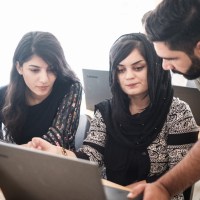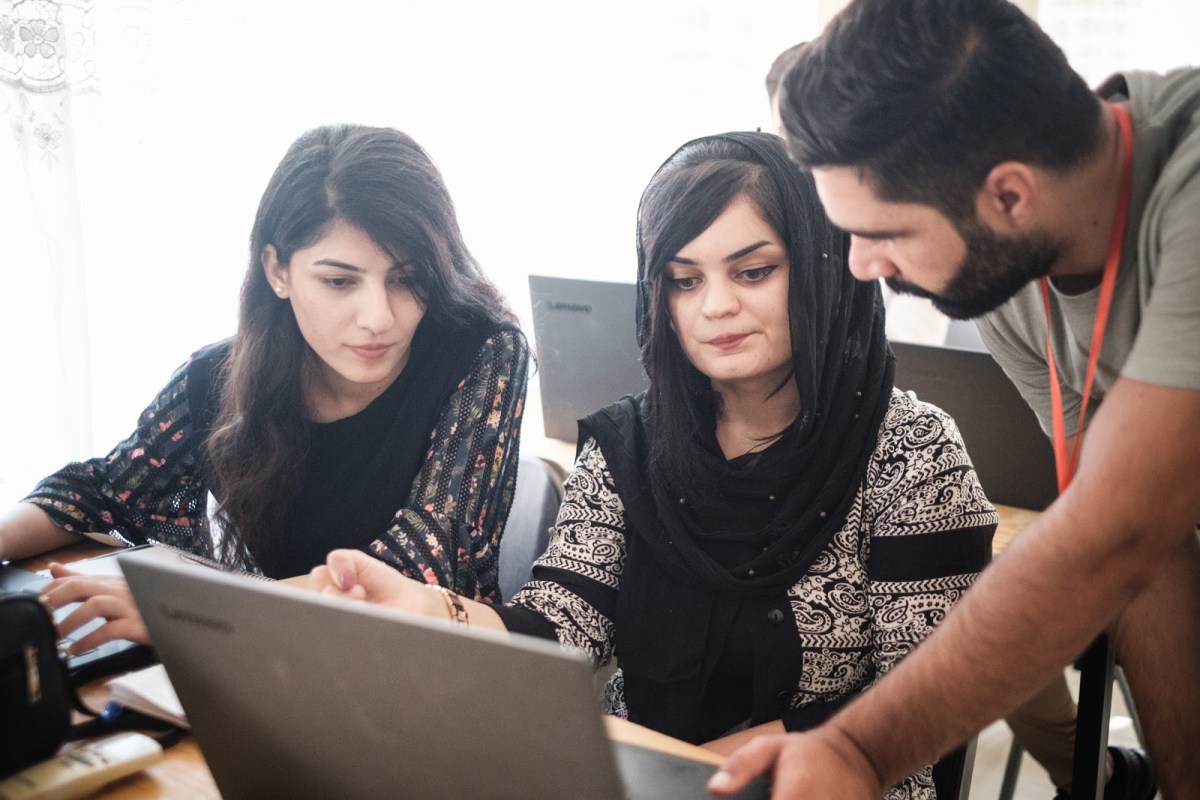“Our tech hub is a place where people with different backgrounds, nationalities, and mentalities come together to achieve different goals. It’s not only jobs that they want. It is also the social interaction.”
This is what one of our tech hub staff shared recently.
It’s hard to track what you don’t measure. And it’s hard to improve, or shift gears to respond to felt needs.
At our tech hubs, where vulnerable Iraqi and Syrian young people learn valuable skills that lead to employment both locally and in the digital marketplace, we have always measured the progress of participants. We pay close attention to the numbers.
Recently, we added a new approach to measuring progress: stories.
We asked tech hub staff to share about their experiences coaching young people to employment in a survey. The insights and stories are collected after a day of teaching basic IT skills, online accounting, microwork, web design, or English. They are stories that have stayed with staff—sometimes for months.
What the survey results show is a positive change not only in the skills of staff and students alike, but also a change in their hearts.
We’re currently in the midst of planning our newest tech hub—a mobile one in Mexico. We hope to bring our training and real-time job opportunities to asylum seekers who fled violence and are now stuck waiting, surrounded by more violence.
Mexico and Iraq are very different from each other, but they share a commonality—a large group of vulnerable people who are desperate to earn a living and provide for their families. We hear the stories of success and opportunity in our tech hubs in Iraq and we know that’s what can happen in Mexico and in other places of conflict and marginalization.
Here’s what we’ve been hearing from our Iraq-based tech hub workers.
What were some of your best experiences at your tech hub?
- “Seeing our workers become assistants was the best part of it all. Another good experience was seeing many of our workers getting good jobs thanks to the efforts that our instructors put into their work.”
- “My best experience as a microwork coach is when more than 30 workers came to the campus to receive their payments (more than $4,000 US) and It was one of the best experiences, because it benefited 30 families, [much] more than 30 people—and this is truly amazing.”
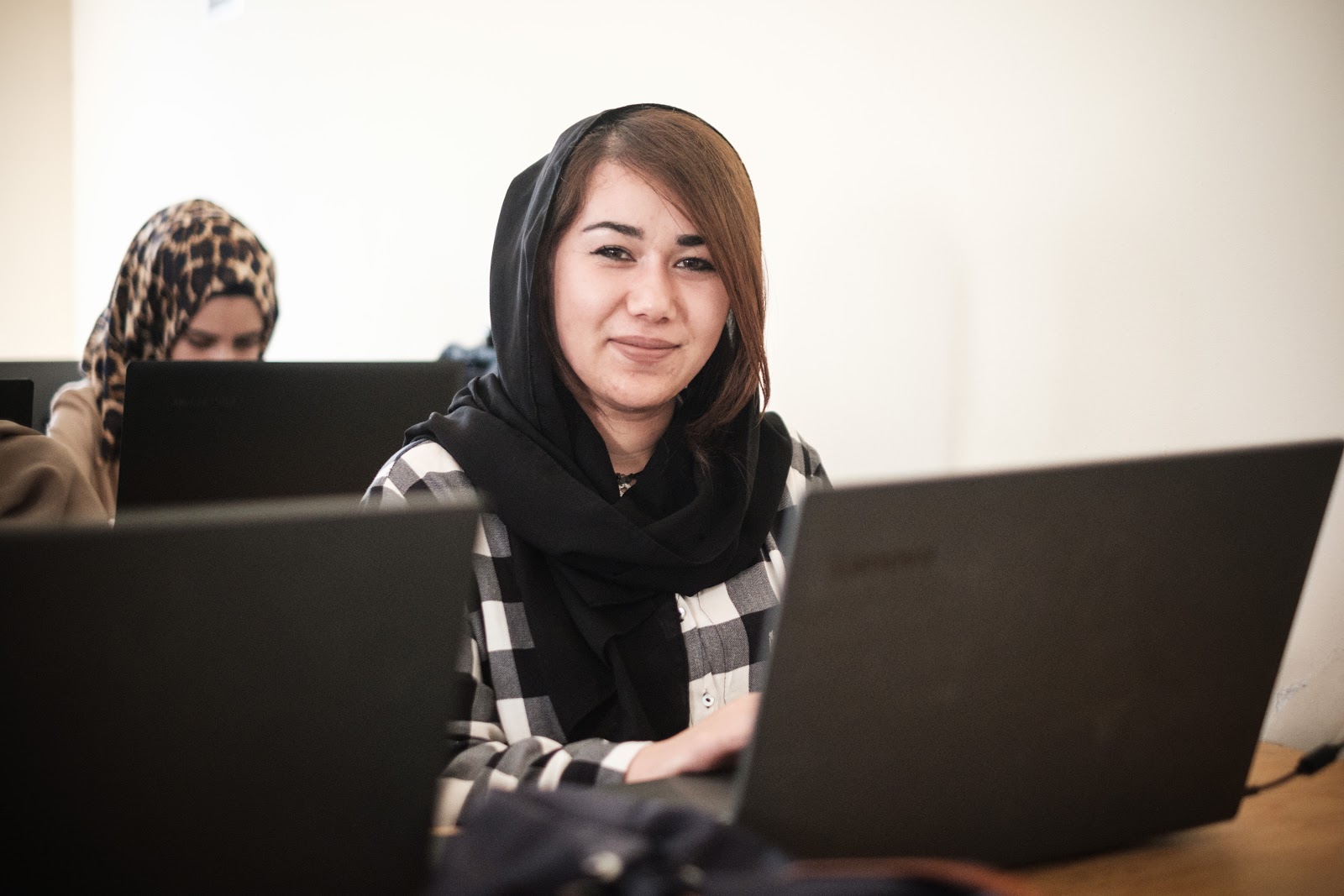
How has your view of humanitarian work been impacted?
- “I worked before with many humanitarian aid [organizations], but what makes this different is that our goals are help the millennials in Iraq to build their future with their own hands, from scratch, which is the best way. Instead of giving money to the refugee or displaced person, they can learn how to make their own money.”
How have you grown and changed?
- “I changed a lot when I joined this tech hub, psychologically and socially as well. I became more confident in myself, and it made me prepare myself for the future.”
- “I have become more patient and understanding of workers’ actions and reactions due to their different backgrounds and identities. Now I accept them open-heartedly, even more than before.”
What did you see and experience?
- “I saw a lot of things, but the amazing thing is that workers from different cultures and religions sit beside each other and help each other.”
- “Being near people who think that they are alone and no one cares about them, and I experience happiness when they tell me that they feel important here.”
- “I saw how diverse our tech hub community is, and I love how passionate most of the workers are learning the necessary skills that will help them secure a better future.”
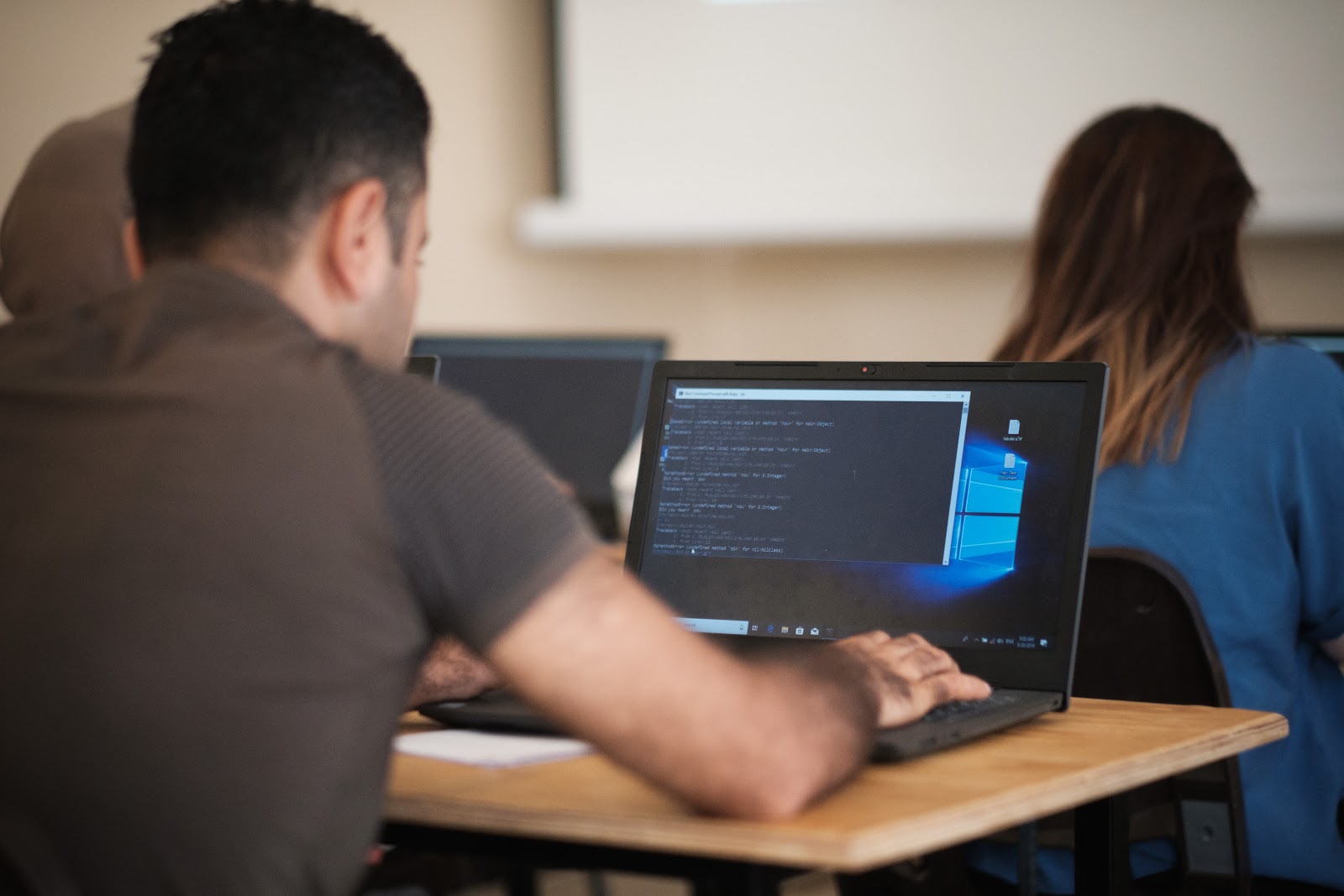
What relationships have been most impactful for you and why?
- “I am so happy to work with teammates from different religions, cultures, skills, and communities.”
What has grabbed your heart and hasn’t let go?
- “I am proud to give accounting information to the workers for two months, which is more than that they [learned in 4 years of] college.”
- “The thing that grabbed my heart and never let go was the graduations. The smile on the workers’ faces was astonishing. It was a smile we have when we accomplish a goal that we put in time and effort to reach. Also, the speeches given at that graduation were moving and inspirational. They, indeed, tell a lot about how each worker felt during the graduation, and how much the workers invested in their personality and professionalism.”
Describe a worker you are most proud of. 
- “Mahammed was one of the hardest workers. He was one of those displaced people who escaped from the hands of ISIS. He was out of school for more than three years, so it had a bad impact on his education. But when he joined our tech hub, he found it a place that can fill that gap of learning. He started with nothing. After he completed his journey with us, he said that he felt that hope, life and soul had come back to him again. He challenged the difficulties of learning English and IT by depending on himself, and practicing with his classmates to overcome them.”
- “Meet Alissa, our youngest worker at WorkWell. She chose to enroll in the Ruby class because she likes to challenge herself, learn something new, and be out of her comfort zone. She has no prior experience in Ruby or programming. During the first week she showed an incredible enthusiasm to learn and sure enough she was able to be the first one in the class and be Worker of the Week more than one time! Her dedication and hard-work distinguished her from classmates. All projects were delivered before the deadline, full marks for all the quizzes and practices, and most importantly creating and developing projects… Alissa created an amazing website using Ruby, Ruby on Rails, HTML, and Bootstrap. The website is a clone of Tesla’s official website, contains more than 3 pages and a menu on the top of the page. Not just that, but adding Bootstrap to the website makes the website visually appealing and user friendly.”
- “I want to talk about Abdulmunim… On the first day of IT classes he told me that he hates computers, he had never used a computer in his life, and he was 32 years old. In the keyboard practice he use to write 2 words per minute, but day-by-day he started to like computers, he tried really hard to learn, and was one of the best and most dedicated workers I’ve ever had. At the end of the course he was really skilled, he learned many skills in MS Office Software, he [could type] 18-22 words per minute. He only finished the Basic IT course, because of his unfortunate circumstances, but after [the course] I called him. He told me that he got a government job and he uses computers all the time on his job! If it wasn’t for what he learned at our tech hub, he wouldn’t have been able to do this job.”
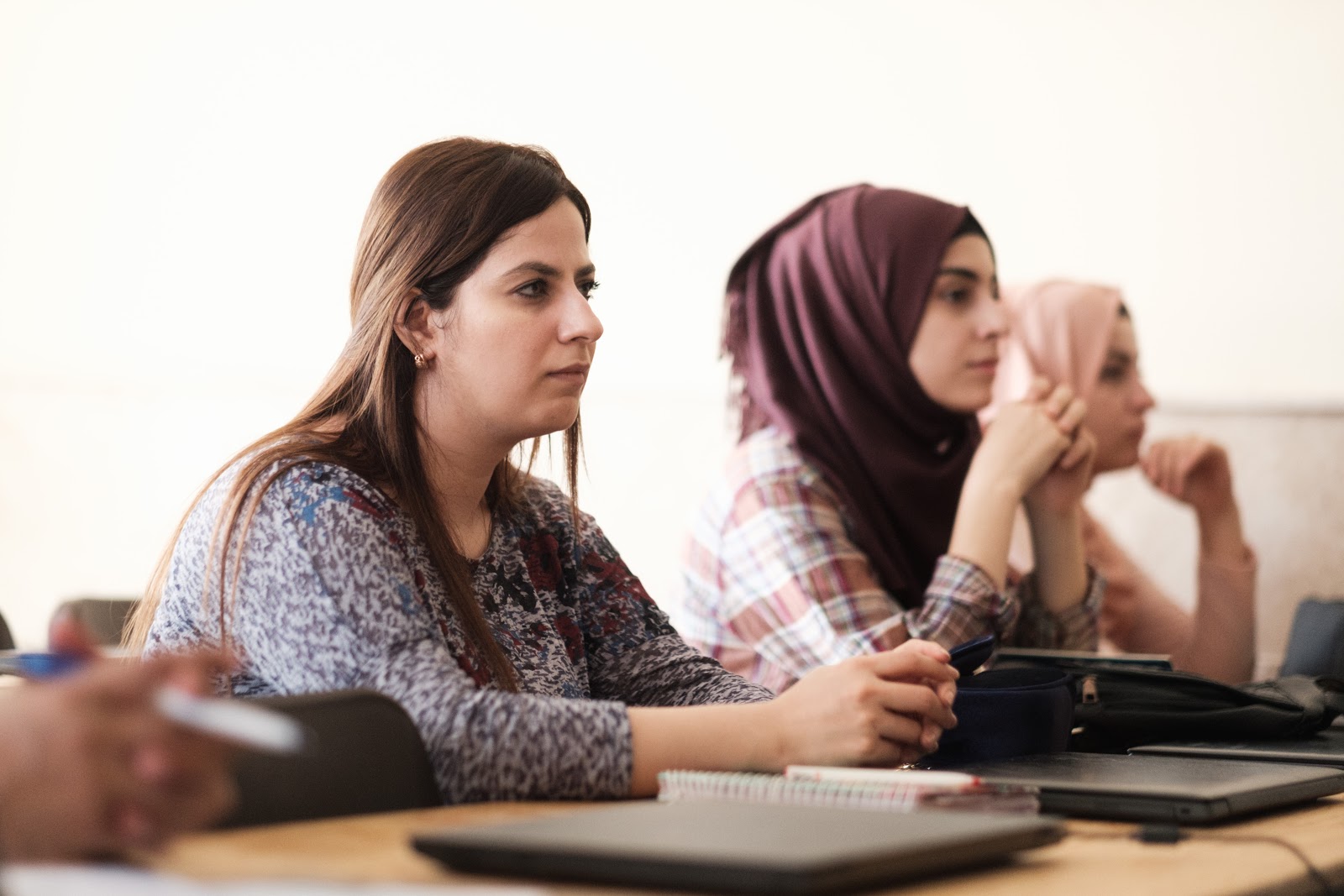
What are the things you’ll never forget?
- “Of course I will never forget the big smile on the workers’ faces whenever someone gets a job.”
- “I will never forget when one of my workers found two jobs in the same month for building websites—one for a makeup market in the city center, and the other for a restaurant.”
- “The moments when workers do an extra assignment and show it to me. I feel like every moment I spent explaining and repeating is effective. The second thing is the graduation, when I hand out the certificate to the workers and say “congrats,” because I know in advance this is an unforgettable moment for them.”
- “The progress of the workers. When they first join us, some of them are hopeless. Some lost many things—family, friends, loved ones, money, education… etc. From the first step they take inside [the tech hub] you can see it in them. But the outcome when they finish is impressive and amazing. They transform completely, they become a family—our family! They have hope again. They have part of their dreams back.”
- “One of the workers said–and this is something I will never forget–she said, ‘Before the tech hub I was hopeless and depressed. But after, I am hopeful!’”
![]()
It’s important to collect statistics for each of our programs. It’s important to establish baselines, and track numbers. We’re diligent with that. But often growth is best seen in insights shared, from the experiences of those working on the frontlines.
Every new session at our tech hubs brings new skills that lead to jobs. But it also ushers in hope for everyone involved.
The displaced and the vulnerable—in Iraq, in Syria, or in Mexico—all need to know there is a way forward, a way out of their current position. You can bring opportunity to them, and a new future. You can create a way for them to earn income, support their families, and rebuild their local community.

